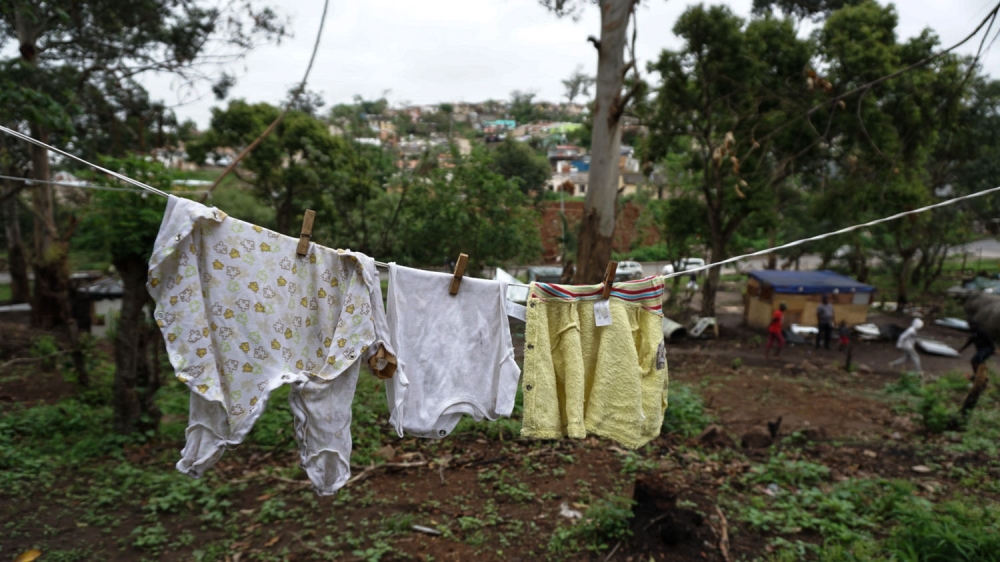Aljazeera
South Africa: The poor of Blinkbonnie Road
![Homes have been destroyed so many times, residents have put up a sign asking for mercy. [Azad Essa/Al Jazeera]](http://www.aljazeera.com/mritems/Images/2017/10/18/c3410f979e924340a802b1de7e346d8b_8.jpg)
Durban, South Africa – Eighteen-year-old Mlungisi Mokoena should be in school, but here he is, on a weekday, guarding his one-room wooden shack roofed with steel sheets.
He belongs to one of 50 families living in a green belt of forest on the corner of Wiggins and Blinkbonnie outside the eastern port city of Durban.
“I don’t have school uniform,” Mokoena says, looking a little sheepish.
Mokoena says that in August, police and the city’s land invasion unit entered the settlement with axes and shotguns. They demolished homes, burned belongings and fired rubber bullets at resistors.
Mokoena was shot in both his legs. His home was razed to the ground too.
“I only had two pairs of pants, one shirt, and two pairs of socks, when they came, they burned it all down. I was left with just a school shirt and two left socks,” he says.
Since August, his home has been demolished two more times.
Mokoena’s story is similar to the experiences of many families here.
Fifty-eight-year-old Noncedile Diko, a domestic worker employed at a middle class family home down the road, returned from work to find her shack razed. She now lives under a collection of plastic and cardboard – branches hold up the sheets, and her home resembles a teepee.
Nhlanhla Kubeka, 27, is still nursing a head injury after being shot at close range with rubber bullets. He says he is afraid to go find work, fearing he might return to an empty home.
 |
| Infants and young children live in these conditions AZAD ESSA/AL JAZEERA |
Debris of razed homes litters the forest. A splattering of fractured steel sheets, broken pieces of wood, glass and rubbish lie between drying clothes and dirty stoves.
Unemployed men gather in the shade of the slinga berry and mango trees and talk numbly. There is no electricity, save for some siphoned lines, and certainly no water. Shrubs serve as toilets.
Children play inside the abandoned large gutter pipes lying about; they taunt and tease each other, blind to the unfit surroundings.
Demand for housing
Land and housing remain contentious issues in post-apartheid South Africa. According to a 2016 report by People’s Environmental Planning (PEP), an NPO that supports communities living in informal settlements, there are some 12 million people without adequate housing in the country.
“According to current estimates, the housing backlog stands at about 2.1 to 2.5 million units,” PEP said.
With the rural economy collapsing, demand for housing close to the cities is on the rise; vacant land in Blinkbonnie Road is prime property.
The city has made it clear that it is not willing to tolerate land invasions.
Warren Burne, a counsellor for the Westville area, told Al Jazeera that “the poor living conditions there were of their own making”.
Earlier this year, a Durban High Court judge ruled that certain people living in Blinkbonnie road were protected from having their shacks demolished.
The court identified 35 families who could live in the forest and gave their homes numbers, marked on their doors or walls in red paint. The Municipality says that the houses that are now demolished were new settlements, a point of contention with the shack dwellers movement, Abahlali baseMjondolo.
 |
| George Bonono, a spokesperson for the Abahlali baseMjondolo movement, says the municipality has no right to demolish homes without providing alternate housing for the occupants AZAD ESSA/AL JAZEERA |
George Bonono, a spokesperson for the movement, told Al Jazeera that it was not clear where those living in the forest were now supposed to go.
Little wonder 18-year-old Mokoena wants to complete school and become a lawyer.
After the turmoil of the past five months, he has good reason.
“I want to become a lawyer, so I can fight for peoples’ rights.
“I just hope that this does not become something that will destroy me,” he says.

![The small forest squeezed between Wiggins Road and Blinkbonnie Road now resembles a refugee camp. [Azad Essa/Al Jazeera]](http://www.aljazeera.com/mritems/Images/2017/10/18/c43a4354f7064015bf6eb1258d26d970_8.jpg)
![The muncipality says the green belt is protected public property and refuse to allow it to be occupied. [Azad Essa/Al Jazeera]](http://www.aljazeera.com/mritems/Images/2017/10/18/0121b0813fb7463099ce59791329dfde_8.jpg)
![Homes are made of wood, steel and often topped by plastic sheeting. [Azad Essa/Al Jazeera]](http://www.aljazeera.com/mritems/Images/2017/10/18/4af045199c134e55a4900e7360d9669e_8.jpg)
![It’s hard to believe that Noncedile Diko, 58, and her daughter Zizile Diko, 23, live in this contraption made of bits and pieces of their old home. [Azad Essa/Al Jazeera]](http://www.aljazeera.com/mritems/Images/2017/10/18/4a922cdca24040bd8fc4ca580a1d4840_8.jpg)
![Residents say invasion units come two to three times a week to demolish their homes. [Azad Essa/Al Jazeera]](http://www.aljazeera.com/mritems/Images/2017/10/18/c4adea1f75204b728a695f56e7c4e566_8.jpg)
![Mlungisi Mokoena, 18, says that he realises completing school is going to be tough but that it's important to do so. [Azad Essa/Al Jazeera]](http://www.aljazeera.com/mritems/Images/2017/10/18/60b24a6948da43f0bebe69e70d889aac_8.jpg)
![Sinenhlanhla Myeza, 24, says she cannot tell if she will be living here for days or a lifetime. [Azad Essa/Al Jazeera]](http://www.aljazeera.com/mritems/Images/2017/10/18/4a8cdbcd8cf94d848d147d20b672f028_8.jpg)
![Gugu Nene, 28, says that when police and authorities arrive, they usually ask no questions and demolish everything in sight. [Azad Essa/Al Jazeera]](http://www.aljazeera.com/mritems/Images/2017/10/18/838679c59386476baa67aa9b4759488b_8.jpg)
![There is no running water or sanitation in the settlement, and there is no indication that conditions will improve. [Azad Essa/Al Jazeera]](http://www.aljazeera.com/mritems/Images/2017/10/18/0770d66af95642778da9fcb54679f5d5_8.jpg)
![Many of the children have been unable to attend school because of the ongoing violence and trouble at home. [Azad Essa/Al Jazeera]](http://www.aljazeera.com/mritems/Images/2017/10/18/9ab8647c278944e69ed89af6b71e3ad4_8.jpg)
![Residents say it can take up to a day to carefully knock together a home which can be demolished in a matter of seconds. [Azad Essa/Al Jazeera]](http://www.aljazeera.com/mritems/Images/2017/10/18/05f9a086cfc847f5a6ebd7d888d2bfe8_8.jpg)